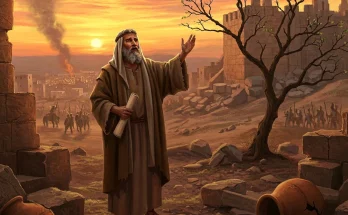When we think of great leaders in the Bible, Moses often comes to mind. After all, he was the one chosen by God to lead the Israelites out of Egyptian bondage—a task that required immense faith, courage, and resilience. But have we ever stopped to wonder what it was about Moses that made him so special in God’s eyes? Why was he chosen for such a monumental task, and what can we learn from his life that applies to our own?
Moses’ journey is one of the most remarkable stories in the Bible. From his miraculous survival as a baby to his encounters with Pharaoh, the parting of the Red Sea, and receiving the Ten Commandments, his life was filled with extraordinary events. But it wasn’t just the miracles and the grand moments that defined Moses. It was also his struggles, his doubts, and even his mistakes that made him a relatable figure—a leader we can learn from.
Here’s a question for us to consider: What does the story of Moses reveal about the kind of people God chooses to lead and accomplish His purposes? This question isn’t just about Moses; it challenges us to think about our own lives and the qualities God values in those He calls. We might expect God to choose someone who is perfect, strong, and confident. But as we dive into the story of Moses, we see that God often chooses the unexpected—a man who doubted his abilities, made mistakes, and struggled with anger and impatience.
This realization might remind us of the apostle John, another key figure in the Bible, who was known for his deep love for Jesus despite his own human imperfections. Just as John was known as the apostle of love, Moses was known for his humility and faithfulness, even in the face of overwhelming challenges.
As we explore the life of Moses, we’ll uncover not only his strengths and accomplishments but also his weaknesses and mistakes. We’ll see how God worked through every part of his journey to fulfill His plan. And in doing so, we’ll find valuable lessons for our own walk with God—lessons that challenge us to reflect on our own leadership, faith, and the kind of people God is calling us to be.
Strengths and Accomplishments
Moses was a remarkable figure chosen by God to lead the Israelites out of Egyptian bondage, a task that required extraordinary courage and faith. As a lawgiver, Moses received the Ten Commandments, delivering God’s laws to Israel, establishing a moral foundation that still influences us today. His role as an intercessor showcased his deep compassion for his people, as he repeatedly pleaded with God to spare the Israelites from judgment, demonstrating his unwavering commitment to their well-being.
Moses was also a miracle worker, through whom God performed incredible signs, such as parting the Red Sea, bringing water from a rock, and providing manna from heaven. These miracles not only secured Israel’s physical survival but also strengthened their faith in God’s power and provision.
As a faithful leader, Moses guided the Israelites through the wilderness for 40 years, showing perseverance and dedication despite the many challenges and complaints he faced. His ability to lead with humility and reliance on God makes Moses a timeless example of true leadership. Moses’ strengths and accomplishments reveal a life marked by obedience, faith, and an unyielding commitment to fulfilling God’s purposes, making him one of the most significant figures in biblical history.
Weaknesses and Mistakes of Moses
While Moses is celebrated for his strengths, his life also reveals significant weaknesses and mistakes that remind us of his humanity. One of the most notable instances was his impatience and anger at Meribah, where instead of speaking to the rock as God commanded, Moses struck it. This act of disobedience, born out of frustration, cost him dearly; God denied him entry into the Promised Land, a profound consequence for a moment of weakness.
Moses also showed reluctance when God first called him to lead the Israelites out of Egypt. He expressed doubts about his ability to speak and lead, questioning whether he was the right person for such a monumental task. This hesitation highlights a lack of confidence in God’s choice, though Moses eventually overcame it.
Additionally, Moses faced family tensions, particularly with his siblings Miriam and Aaron, who challenged his leadership at times. These conflicts added to the burdens of leadership, showing that even within his own family, Moses struggled with maintaining unity and authority.
These flaws remind us that Moses, despite his closeness to God, was not without his struggles. His weaknesses offer valuable lessons in humility, the consequences of disobedience, and the importance of trusting in God’s plan.
Lessons from His Life
The life of Moses offers profound lessons that are still relevant for us today. One of the most significant is the importance of faith and obedience. Although Moses initially hesitated to accept God’s call, he ultimately demonstrated unwavering faith and obedience, leading the Israelites out of Egypt and through the wilderness. This teaches us that even when we doubt our abilities, trusting in God and following His commands can lead to extraordinary outcomes.
Moses also exemplifies leadership under pressure. Throughout the 40 years in the wilderness, he faced constant challenges, opposition, and complaints from the people he led. Yet, he remained humble and patient, qualities essential for any leader today. Whether we’re leading a team, a family, or ourselves, Moses’ example encourages us to lead with grace, even in difficult circumstances.
His role as an intercessor highlights the power of prayer. Moses consistently stood in the gap for the Israelites, pleading with God for mercy. This teaches us the importance of praying for others, especially when they are struggling or going astray.
Finally, the consequences of disobedience are evident in Moses’ life. His failure to fully obey God at Meribah cost him entry into the Promised Land, reminding us that obedience to God’s instructions is not optional but vital. In our lives, this calls for careful attention to God’s Word and a commitment to follow His guidance, knowing that our actions have significant consequences.
These lessons from Moses’ life challenge us to grow in faith, lead with humility, intercede for others, and prioritize obedience to God.
Vital Statistics for Moses
Moses is one of the most significant figures in the Bible, with a life marked by pivotal events that shaped the history of Israel. His timeline begins around 1525 B.C. with his birth, which was marked by divine protection as his mother placed him in a basket on the Nile to save him from Pharaoh’s decree to kill all Hebrew baby boys. He spent 40 years as a prince in Egypt, followed by 40 years as a shepherd in Midian after fleeing Egypt. At around 80 years old, he was called by God through the burning bush to lead the Israelites out of Egyptian bondage, a mission that spanned the next 40 years.
Moses’ family and key relationships played crucial roles in his life. He was born to Amram and Jochebed of the tribe of Levi, with his siblings Miriam and Aaron playing significant roles in his leadership. Miriam acted as a prophetess, while Aaron served as his spokesperson and the first high priest of Israel.
The major events in Moses’ life include the Ten Plagues, the Exodus from Egypt, the parting of the Red Sea, receiving the Ten Commandments on Mount Sinai, and leading the Israelites through the wilderness for 40 years. His death occurred at the age of 120, just before the Israelites entered the Promised Land, marking the end of a remarkable life devoted to God’s service.
- Tribe: Levi
- Family: Son of Amram and Jochebed; brother of Aaron and Miriam
- Occupation: Shepherd, Prophet, Leader of Israel
- Time Period: Approximately 1400-1200 B.C.
- Age at Death: 120 years old
Key Verse or Verses
“By faith Moses, when he had grown up, refused to be known as the son of Pharaoh’s daughter. He chose to be mistreated along with the people of God rather than to enjoy the pleasures of sin for a short time” (Hebrews 11:24-25)
Moses’ story is told in the books of Exodus through Deuteronomy. He is also mentioned in Acts 7:20-44; Hebrews 11:23-29.
Frequently Asked Questions (FAQ) About Moses
Why was Moses chosen by God to lead the Israelites out of Egypt? Moses was chosen by God because of his unique background, faith, and humility. Raised in Pharaoh’s palace but with a deep connection to his Hebrew heritage, Moses was positioned to understand both Egyptian and Israelite cultures. His faith and willingness to follow God’s commands, despite his initial reluctance, made him the ideal leader to fulfill God’s plan of delivering His people from slavery.
What were the key challenges Moses faced as a leader, and how did he overcome them? Moses faced numerous challenges, including the stubbornness of Pharaoh, the constant complaints and disobedience of the Israelites, and personal doubts about his ability to lead. He overcame these challenges through prayer, reliance on God’s guidance, and by acting as an intercessor for the people, consistently pleading with God for mercy and direction.
What lessons can we learn from Moses’ mistakes? Moses’ mistakes, such as striking the rock at Meribah instead of speaking to it as God commanded, teach us the importance of complete obedience to God’s instructions. His actions remind us that even great leaders can falter and that the consequences of disobedience can be significant. These lessons encourage us to trust and obey God fully in our own lives.



